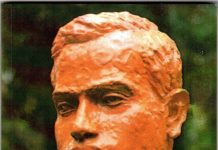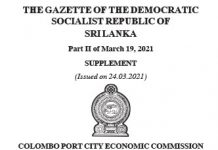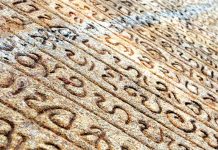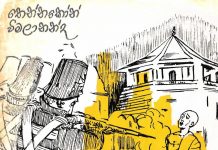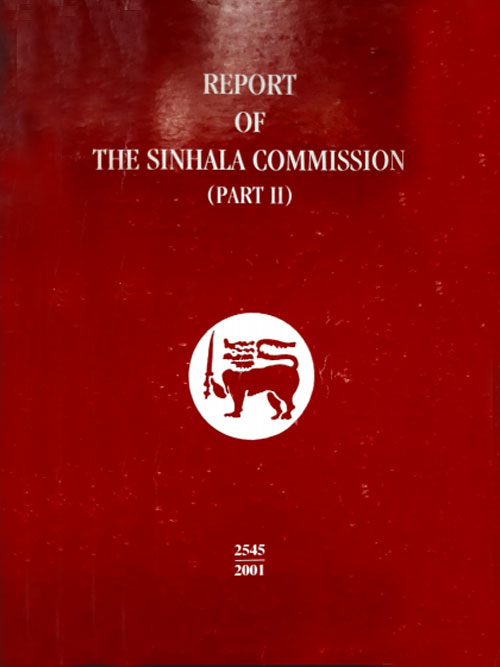Page 745, 746, 747, 748
State Council of Ceylon
May 24, 1944
May 24 1944) Sinhalese as Official Language. Debates.
745
SINHALESE AS OFFICIAL LANGUAGE OF CEYLON.
Mr. Jayewardene: Sir, I wish to move the motion standing in my name. I have given notice to secure the permission of the House to suspend Standing Orders in order to enable me to move this motion and dispose of
it to-day.
Mr. H. W. Amarasuriya (Galle) seconded.
Question, ” That the relevant Standing Orders be suspended to enable the motion to be moved and disposed of this day put, and agreed to.
Mr. Jayewardene: Sir, the motion standing in my name reads as follows:
That with the object of making Sinhalese the official language of Ceylon
within a reasonable number of years this Council is of opinion—
(a) That Sinhalese should be made the medium of instruction in all schools;
(b) That Sinhalese should be made a compulsory subject in all public examinations ;
(c) That Legislation should be introduced to permit the business of the State
Council to be conducted in Sinhalese also ;
(d) That a Commission should- be appointed to choose for translation and
to translate important books of other languages, into Sinhalese;
(e) That a Commission should be appointed to report on all steps that
need be taken to effect the transition from English into Sinhalese.
Representations have been made _ to’ me by many of my Tamil friends—.—
The Hon. Mr. D. S. Senanayake (Leader of the State Council and Minfstep of Agriculture and Lands) : I should like to have a
ruling on a point of order. Would this motion not be anticipating the
motion of the Hon. Minister of Education, where he says that the
medium of education should be the mother tongue? We are trying to decide that, Sinhalese should be the mother tongue. I am not saying anything against it, but I only want to be certain that we are in order.
Mr. B. H. Aluwihare (Mataie): May I submit that these motions are dealt wit,h in the order- of priority; and the motion of the hon. Member for Relaniya is verv much earlier than the motion of the Hon. Minister of Education. There might have been some sense in the hon. Member for Kelaniya raising that point of order when the I- Ion. Minister moved his motion, But not in th*s case.
The Hon. Mr. J. H. B. Nihili (Legal Secretary): point of order. Should not, the hon. Member explain why it is necessary to suspend Standing Orders ?
Mr. Speaker: We have wassed the motion to suspend Standing Orders already.
Mr. Jayewardene: Having got over the preliminary hurdles which I should expect, mom such the Hon’. the Legal Secretary, against making Sinhalese and Tamil the official languages of the country, I wish to say, in continuation Of my speech, that as representations have been made to me by my Tamil friends that Tamil also should be included as an official language, I wish to obtain the permission of the House to amend my motion by the inclusion Of the words “ and Tamil” after the word Sinhalese wherever the word occurs.
•Mr. A. F. Molarnure (Balangoda): “Sinhalese Or Tamil ”
Mr. Speaker: Does the House give the hon. Member permission to make the necessary alteration?
Members: No.
The Hon. Mr. Nihill: Does that make sense? The amendment does not make
Sense. Which is to be the medium Of instruction? As moved by the hon. Member it Simply makes nonsense of the first line of the motion. There can only be one medium.
Mr. Jayewardene: The Hon. the Legal Secretary can move an amendment
which makes sense.
The Hon. Mr. Nihill: Substitute “media” for “medium”
Mr. Jayewardene: Why does he not move it?
Mr. Speaker: Does the Hon. the Legal suggest that?
The Hon. Mr. Nihi11: No, Sir, I suggest nothing at all.
•The Hon. Mr. B. W. R. D. Bandaranaike (Minister of Local Administration): The hon. Member cannot move that amendment at this stage without general agreement by the whole House.
•Mr. Susanta de Fonseka (Panadure): Who said that?
•The Hon. Mr. Bandaranaike: Otherwise it must be moved as a formal
amendment to the motion later on.
Mr. Speaker: The hon. Member wants to alter the terms of the motion.
•The Hon. Mr. Bandaranaike: That cannot be done at stage unless the entire House agrees. An amendment to the motion can be moved by any Member later on, but for the mover to amend his Own motion which is on the Agenda in a certain form must, I submit, have the general consent Of the House.
Mr. Speaker: I am of a different opinion. The motion is not before the House yet; until it has been moved and seconded, the motion is not in the possession of the House. But for this alteration, notice should have been given by the hon. Member—for the alteration he proposes to make.
•The Hon. Mr. Bandaranaike: Otherwise the whole House must agree.
Mr. Speaker: Otherwise, with the indulgence of the House, he can make that alteration. Does the House grant the hon. Member permission? [MEMBERS : No.] Then no alteration can be made unless notice is given of alteration. alteration.
Mr. Jayewardene: My motion seeks to displace English from the position which it has held for over 125 years as the official language of this country. Though English has been the official language for so many years, Only 10 per cent of a population of over 6,000,000 speak and know that language.
The tragedy that is enacted everyday in our Courts, in our Public Departments and in the lives of our people is very vividly described in that famous book, which I would advice hon. Members of this Council to read, called “The Village in the Jungle”. There, Sir, a villager from a hamlet in the Harnbantota District is brought up for trial in the Courts before an English Magistrate and after n number of days of trail, during which he did not understand a single of what passed between the Judge. counsel and the other officials, he is sentenced to a long term of imprisonment, and even at that stage does not know what had happened. That tragedy is occurring even today.
It is argued by those who know only English, who been educated only in English, that if we displace English and make Sinhalese and Tamil the official languages, we will be shutting out a large world of literature and culture from our people. They little understand that that, world of literature is already a closed book to 90 per cent. Of Our people. We can today, after so many years of English as the language, measure its achievements in this country. It is true that we have produced a number Of famous lawyers, doctors and Judies and possibly legislators, but in the field of literature, of science, Of culture, we have been entirely barren of achievement.
It was not so when the native language was the language of the Government. I think history records that wise men both from the East and the West came to the shores of Lanka to read the books that were preserved in the sanctuaries of the Buddhist Sangha. If one reads the travels of Hsuen Tsang. Marco polo and Fa Hien. and the lives of great Western philosophers, such as Dr. Dhalke and Rhys David and others. we would find the contribution that this country made to world literature when we had our own language as the official Language.
It is said that many of the mysteries of Indian history were unraveled by the translation of the Mahavamsa into English, but today our youths, after so many years Of British rule, are more interested in the love affairs Henry VIII. than in the historical events pictured in the Mahavamsa; they are more aware Of the materialism preached by Western pundits. than in the truths which are embodied in the Abhidharma. It is with a view to changing this situation, a situation which can only be changed by substituting the national languages as the official languages, that I have thought it wise to introduce this motion.
If we look again at our educational structure, which will come up for examination on the motion to be moved by the minister of Education, we will find that we are spending over Rs. 20,000,000 a year for maintaining a system of education which creates two classes. Over 80 per cent of our schools educate over children in Sinhalese and Tamil, while only about 6 or 7 per cent. of the children are given an English education. But the official language is English, and that is why this country is always in danger of being governed by a small coterie who go through those English schools, whereas the vast majority who go through the Sinhalese and Tamil schools must always be in the position hewers wood and drawers of water.
We have not only defects in our own system of education as an example and argument for accepting this motion; we have also the example of other countries which have been for many centuries under foreign domination, and once they have become free or almost free they have dropped the foreign language and adopted their own language. I will take an example, first, the Irish Free State. After centuries of Anglicization, the native language Of the people of Ireland —Gaelic—was forgotten; hardly 10 per cent. spoke the language of the people. Thanks to the efforts of Dr. Hyde. who Inter became President of the Irish Free State, the Gaelic League was started, and Gaelic was again make popular among the people. When Mr. D. Valera began his great fight for freedom. and succeeded. he insisted that the native language of the people of Ireland. though was spoken only by 10 per cent., unlike in Ceylon where only 10 per cent. speak English, should be made the official language. He Set aside all objections and he made that language the official language Of Ireland.
We also have the example of India where the Indian National Congress had insisted that English should be supplanted from its position as the official language, that linguistic provinces should be created, and that Hindi should be the offcial language. We See that in Hyderabad and in the Other Native States of India the official Language is the language of the people. No difficulty, I think, can be visualized Once the spirit Of the motion is accepted and the methods which I have outlined are put into effect.
If only the Board of ministers elected in 1931 and the Minister of Education who was elected in 1931 had taken the necessary steps with a vision that should have been theirs, to put into effect a proposal such as this, it may be that today we would be able to speak in the languages of the people in this Council and in our other legislative assemblies. It is not too late even at this stage to make a start to see that Sinhalese and Tamil are made the official languages of this country.
It becomes all the more important that we should adopt this motion at this stage, because the Minister of Education is introducing very far-reaching proposals next week in this Council, one of which is to make English education free. Before you create an educational system in which you teach English as a free and compulsory language, you must have clear before your eyes what is going to be the official language of this country. Are you going to educate the people Of this country, 80 per cent. of whom do not at present get an education in English, while the official languages of the country are to be Sinhalese and Tamil? Or are we in the future going to have English as the official language? I think that that is the most important decision which should be taken by the educational authorities before they decide whether the medium Of instruction should be the mother tongue Or English. The educational structure should be suited to the official language. One might as well teach Dutch and not English if English is not going to be the official language.
Therefore, I would place this motion before the House; and I wish to speak a word Of explanation with regard to my desire to include Tamil also. I had always the intention that Tamil should be spoken in the Tamil-speaking provinces, and that Tamil should be the official language in the Tamil-speaking provinces. But as two-thirds of the people of thig Country speak Sinhalese, I had the intention of proposing that only Sinhalese should be the official language of the Island; but it seems to me that the Tamil community and Also the Muslim community, who speak Tamil, wish that Tamil also should be included on equal terms with Sinhalese. The great fear I had was that Sinhalese being a language spoken by only 3,000,000 people in the whole world would suffer, Or may be entirely lost in time to come, if Tamil also placed on an equal footing with it in this country. The influence of Tamil literature, a literature used in India by over 40,000,000 and the influence of Tamil films and Tamil culture in this country, I thought might be detrimental to the future Of the Sinhalese language; but if it is the desire Of Tamils, that Tamil also should be’ given an equal status with Sinhalese, I do not think we should bar it from attaining that position.
I do not think there will be any difficulty in this House. which is composed of representatives chosen on a universal franchise, in securing the end we have in view. 1t is the universal franchise that has brought the English-educated and the masses together, and it is the impulse created by the use of the universal franchise, by the ideas realized by the grant of universal franchise which enable the people to choose their rulers. which will ultimately make Sinhalese and Tamil the official languages of this country. I would therefore suggest to this House that we anticipate that event, and give it the sanction of our vote and decision.
Language. Sir, is one of the most important characteristics Of nationality. Without language, a nation stands chance of being absorbed Or Of losing its identity. With language, it has a chance Of living for centuries. It is because Of our language that the Sinhalese race has existed for 2,400 years, and I think that, composed as we are in this House, on the eve Of freedom as a free country we should prepare for a national official language. This House, I am sure, will vote with me that, English should be deposed from its position as the official language Of the country and Sinhalese and Tamil. the ancient languages of our people, spoken by over 80 to 90 per cent.. of our people. should be made the official languages of Lanka.
Mr. H. W. Amarasuriya seconded.
Question proposed from the Chair, and debated.
•Mr. Aluwlhare: Sir. I did not allow the mover of this motion to amend it to include Tamil because thought that the motion really covered a much wider field than the hon. Member himself intended
Sinhalese-as-Official-Langage1 Sinhalese-as-Official-Langage
